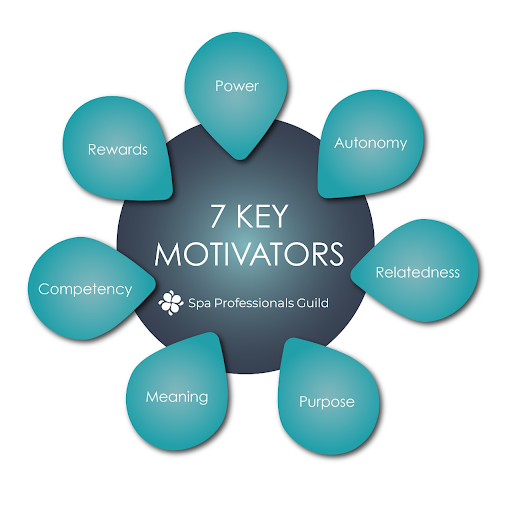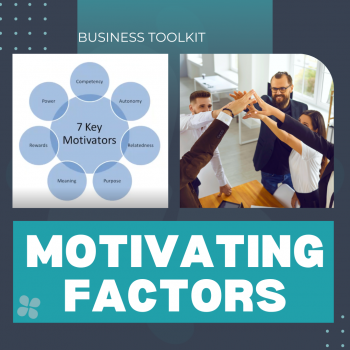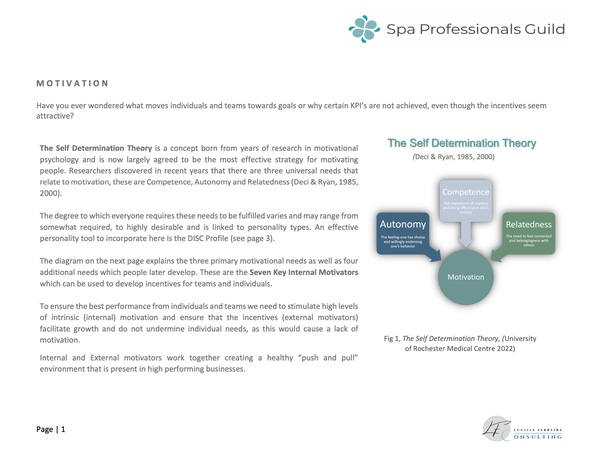Last week we had the privilege of interviewing Lucille Ferreira from Australia to find out about her biggest managerial challenges. If you missed it Click Below to watch this valuable interaction.
Lucille agreed to share more with regards to the 7 MOTIVATING FACTORS she discussed during the session, and give us examples of how they relate to our industry. A reminder that these 7 motivating factors are ………..

The 7 Key Motivators are particularly helpful when formulating incentives. Once you know what each team member’s personality profile is, have a look at the workbook (👈 click the link) and follow the activities to understand how your team can be motivated by these principles.
Power
Which incentives can you think of to reward a group motivated by “Power”? Some examples are personal development, professional development, increased responsibility, financial education, and public recognition to name a few. People who love power, love to be empowered.
Autonomy
Whether someone likes to work Autonomously (independently) or whether they prefer to work under occasional supervision, can you think of incentives to support these intrinsic needs? We either drive motivation by stimulating these needs or we watch as things slowly spiral into demotivation.
Relatedness
Being aware that people have differing needs for levels of relatedness, connectedness and belonging, will work towards creating a positive work culture and a productive work environment where people feel acknowledged and part of something bigger. If you have ever wished you could wave a magic wand and turn around the culture within the team and business, this is one of the strongest motivators to achieve that.
Purpose
Being clear on what the mission of the business is and identifying a team who have the same passion is half the race won. People who are motivated by purpose are loyal and will often go the extra mile regardless of incentives offered. For example, your receptionist who works tirelessly to keep customers happy and has the sole purpose of being a delight to the clients while wearing the many hats required at reception, may feel extra motivated to recommend some LED packages or upgrade options over the phone if she knows that this is part of her purpose, because it enhances the customers results and experience. Now if you link that to a personal goal she might have, such as learning to invest in shares, it would be a good idea to set her a KPI to recommend a minimum of 4 LED packages over the phone per week and track the outcome, so that you can reward her with a monthly contribution to a shares account in her name.
Meaning
Find your why and you will find your way. Understanding the emotional motivation of your team is important to get them through the tough times, when giving up seems like the only option. Why do they come to work each day, what “bigger cause” is it contributing to? Is this a personal cause in their own lives, a community cause that the company can get involved in, is it because they believe the work they are doing is contributing to a worthy cause that improves the lives of many or is it all the above?
Competency
While some see value in continually pursuing higher levels of competency in all areas, others are content to achieve a certain level and remain there consistently. Our inclination as leaders is often to continually drive everyone to “be more” and while healthy competition and ongoing education almost always elevate performance, there is also a breaking point for those who would otherwise have continued with a company for many more years, if they were okay to focus on doing things they love and are good at. For example, a well-intended push toward doing Medi-Spa Therapy may scare off a brilliant Day Spa therapist who does not see value in acquiring Medi-Spa skills because it is simply not her passion.
Rewards
A healthy reward system involves knowing what the employee’s needs, goals and desires are. Then, creating a reward that matches the workload and the profitability of the challenge. For example, a huge opening order has just arrived on the 1st of the month. Sales last month were slower, and you realise that someone has over ordered. You need to move the old inventory before unpacking the new stock, so you set about creating bundles and special offers. Your goal is to have the team sell at least half the old stock by month end.
If successful, you know this will leave sufficient profit margin to take the entire team on a luxury outing. You ask the team to nominate 3 experiences within the budget provided to them and you hide these inside a bunch of balloons in the staff room. The team know if they all make target, they will pop a balloon at the end of the month to go somewhere special AND as a cherry on top, the best performer gets to pop a bonus balloon, which contains a VISA card worth 5% of their sales or a mystery voucher. (Remembering that the team continue to earn their regular commission on these sales)
Yes, they all still earn their commission, because this is not a monthly occurrence, it is a motivational activity to get quick results. The plus side is that the excitement of the challenge will evoke the reward system of the brain and so even if the target is not reached despite the team’s good effort, the top performer is still allowed to pop their incentive balloon. Thank the team for trying so hard and then work out individual targets for the next month to continue balancing the stock.
The above is an example that I have seen at work firsthand, the team at this business did nearly THREE TIMES their regular retail figure that month!
CLICK HERE to download the workbook
We have an extra gift for you all! A coaching session hosted by Lucille on the 19th of October where she will unpack HOW TO FAIL & WIN!!! Sounds bizarre right, how do you fail and win?? We’re not going to give away too much info here because you simply cannot miss this session. So, click on the image below and register to attend.

See you all there!
Marisa xxx


